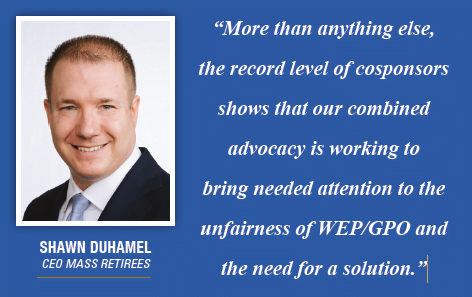Will Supermajority Congressional Support Yield Results?
Congressional support to bring an end to the Social Security Windfall Elimination (WEP) and the Government Pension Offset (GPO) has reached a supermajority in both the US House of Representatives, and, for the first time ever, in the US Senate.
But will the 326 Representatives supporting HR82 and the 60 US Senators cosponsoring S597 translate to either bill being brought to the floor for an official vote? This is an open question, which is made even more difficult to answer during a heated presidential election when the two branches of Congress are narrowly split between Democrats and Republicans.
With Congress scheduled to return to session on September 9th, following the August recess, there are bipartisan calls on both sides of Capitol Hill for one or both bills to be released from their respective committees and brought to the floor for a vote. In the Senate, where the lead sponsor of S597, Sherrod Brown (D-OH), is locked in what is expected to be a close reelection fight, the 60-vote threshold to overcome a filibuster has been reached for the first time. While the official count stands at 62 cosponsors, both former Senators Dianne Feinstein and Robert Menendez remain included within the support tally.
Within the 100 member US Senate, S597 has the support of 44 Democrats, 13 Republicans, and the body’s 3 independents. Within the 435 member House, HR82 has the bipartisan support of 210 Democrats and 116 Republicans.
While previous Congressional sessions have witnessed supermajority support in the House, 2024 marks the first time the level of support has been achieved in the Senate. It is likely the result of the intense national pressure being applied to federally elected officials by public retirees and active employee unions from across the country. Nationwide, more than 2.1 million retirees are currently impacted by the WEP and roughly 750,000 by the GPO.
However, the two lead sponsors of HR82 are not standing for reelection to Congress. The bill’s lead sponsor, Congressman Garret Graves (R-LA) has lost his seat due to redistricting. Graves primary cosponsor, Congresswoman Abigail Spanberger (D-VA) is not seeking reelection, instead running for Governor of Virginia. How this development may impact the ability to bring HR82 to the House floor for a vote in 2024 remains to be seen.
According to the official Congressional Calander, there are only eight weeks of scheduled formal sessions remaining in the 2023-2024 Session. Sessions are scheduled from September 9-27, and post-election “lame duck” sessions November 12-22, and December 2-20.
“There is no question that the grassroots advocacy taking place across the country has achieved positive results in the form of a record number of cosponsors. However, cosponsors do not necessarily translate to the required majority floor votes to pass a bill,” says Mass Retirees CEO Shawn Duhamel.

With the recent Congressional hearings on the topic as a guide, we still believe that the likely outcome will be reform of WEP/GPO rather than full repeal. “The last thing we want to have happen is for a bill to be brought to the floor, only to be voted down. That would be a major setback.”
Since last November, the House, which is controlled by a narrow Republican majority, has conducted two official hearings on WEP/GPO. The Senate, which is controlled by a narrow Democrat majority, has held one hearing on the subject.
As previously reported, the Capitol Hill hearing held by the House in April featured expert testimony opposed to full repeal of the two laws. The reasons cited speak to the original intent of WEP/GPO when the laws were passed in 1983 – to stop what some deemed to be an unfair overpayment of Social Security retirement benefits to those who did not contribute to the Social Security system for the bulk of their full-time working career. To be exempt from WEP, one would need to have substantial earnings covered by Social Security for at least 30 years (120 quarters).
“As a retiree harmed by the WEP law, I can personally attest to the financial hardship caused by this unfair law. And we know that the hardship caused by the GPO can be even worse. Not a day goes by where we do not hear from members who have been harmed,” said Mass Retirees President Frank Valeri. “These laws have to change and we will continue to do everything in our power to advocate for Congress to act. What we will not do is mislead our members as to what is politically possible. That is not how Mass Retirees operates.
“Members deserve to hear the truth. And the truth is that these issues are very hard to resolve, despite the number of cosponsors. Changes to Social Security impact the whole country, and not everyone agrees that full repeal should occur. Others are concerned about the cost of repeal, which is reported to be at least $180 billion over the next ten years. This would directly impact the solvency of Social Security. For these reasons we must be open to compromise. Our members need relief, and we’re determined to achieve a viable agreement to deliver that relief.”



